#grim & circe༻sister from another life
Text
An Introduction to Worshipping Medeia
As a Hellenic witch, the worship of Medeia is an important part of my practice. She was a witch and priestess of Hekate, possessing nearly unparalleled knowledge of magic and poisons. I wanted to write this post to give some background on who Medeia is, her role as a witch and a priestess, and how I have come to honor her in my practice.
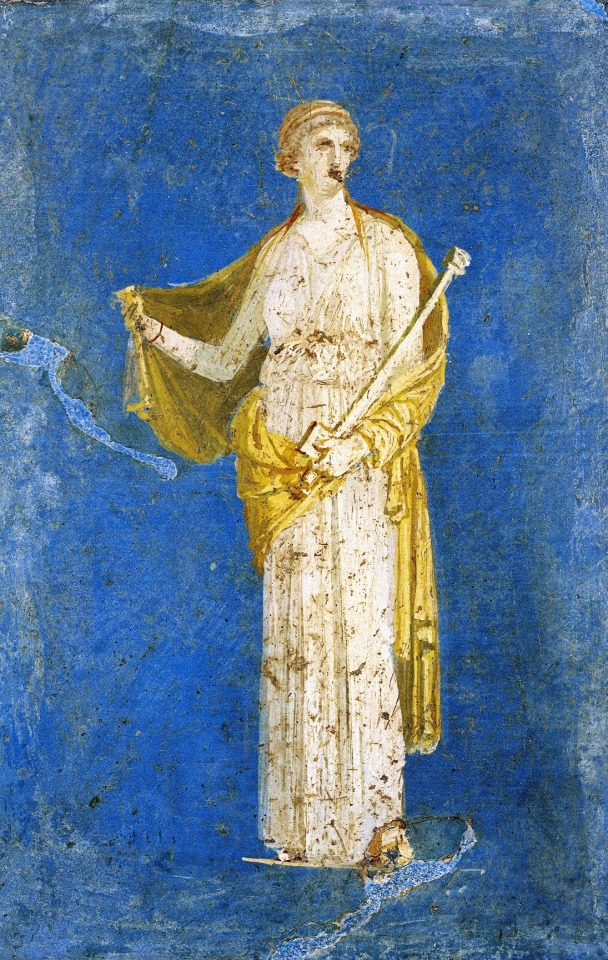
Who is Medeia?
Parentage
Medeia (Μήδεια) is given mainly two parentages, either Aeetes, son of Helios, and Eidyia, daughter of Oceanus, or Hekate and Aeetes. Hesiod offers us a description of the first, writing:
“To the tireless Sun the renowned Oceanid Perseïs bore Circe and King Aeetes. Aeetes, son of the Sun who makes light for mortals, married by the gods’ design another daughter of Oceanus the unending river, fair-cheeked Idyia; and she bore him the trim-ankled Medea, surrendering in intimacy through golden Aphrodite” (Hesiod 31)
Alternatively, Diodorus names Hekate and Aeetes as her parents, explaining:
“Perses had a daughter, Hecate, and she excelled her father in her brazen lawlessness...She was a keen contriver of mixtures of deadly drugs [pharmaka], and she discovered the so-called aconite. She tested the powers of each drug by mixing it into the food given to strangers...After this she married Aeetes and gave birth to two daughters, Circe and Medea, and also a son Aigialeus” (qtd. in Ogden 78)
Either of these parentages could make sense, but I personally observe the first.
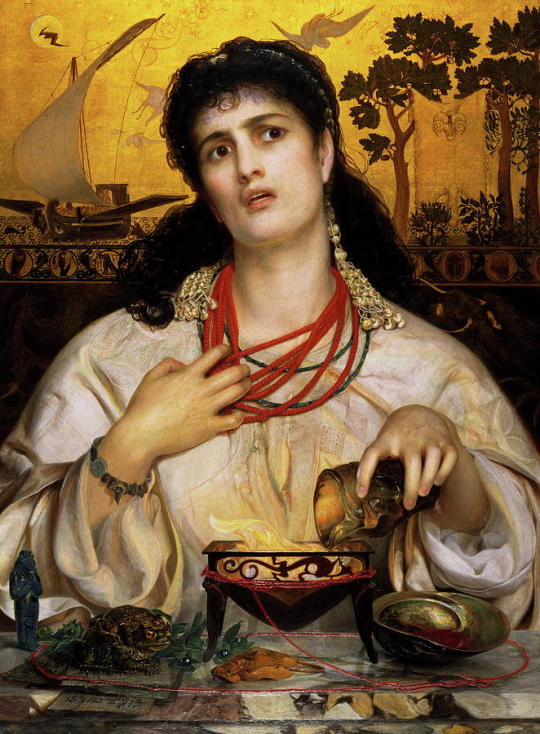
(Art: Medea by Frederick Sandys)
Medeia as the Witch Priestess of Hekate
One of Medeia’s most important roles in literature and myth is that she is a priestess of Hekate and a witch, being called “Medea of the many spells” (Apollonius of Rhodes 109). In most literature there is no way to separate these roles.
She was extremely devoted to Hekate, Apollonius of Rhodes stating that “as a rule she did not spend her time at home, but was busy all day in the temple of Hecate, of whom she was priestess” (116). Euripides also writes that Medea says “I swear it by her, my mistress, whom most I honor and have chosen as partner, Hecate, who dwells in the recesses of my hearth” (Euripides 13). Clearly, the relationship between her and Hekate was very close, and it was said on occasion that she even learned magic from Hekate, Herself. Apollonius of Rhodes writes that “[t]here is a girl living in Aeetes’ palace whom the goddess Hecate has taught to handle with extraordinary skill all the magic herbs that grow on dry land or in running water” (123). Diodorus also claims this, but adds an interesting addendum that attributes to the character of Medeia:
“They report that Medea learned all the powers of drugs from her mother [Hekate] and her sister [Kirke], but her own inclination was the opposite. For she continually saved the strangers that put in from dangers” (qtd. in Ogden 79)
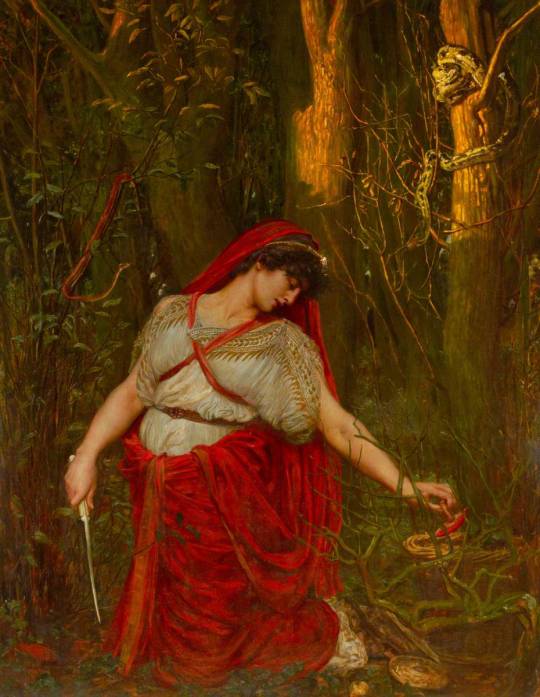
(Art: Medea the Sorceress by Valentine Cameron Prinsep)
Regardless of the origins of her powers, they were no doubt incredible. Apollonius of Rhodes explains that “she can put out a raging fire, she can stop rivers as they roar in spate, arrest a star, and check the movement of the sacred moon” (123). In one instance Apollonius states that “the beautiful Medea spell through the palace, and for her the very doors responding to her hasty incantations swung open of their own accord...From there she meant to reach the temple. She knew the road well enough, having often roamed in that direction searching for corpses and noxious roots, as witches do” (148). This is clearly an indicator that her powers are incredible, but what is even more awe-inspiring is what Apollonius says happens next:
“Rising from the distant east, the Lady Moon [Selene], Titanian goddess, saw the girl wandering distraught, and in wicked glee said to herself: ’So I am not the only one to go astray for love, I that burn for beautiful Endymion and seek him in the Latmian cave. How many times, when I was bent on love, have you disorbed me with your incantations, making the night moonless so that you may practice your beloved witchcraft undisturbed!” (148).
Medeia is said to be able to actually banish the moon Herself from the sky, an unimaginable feat. This is indicative of the degree of power she possesses, having sway over nature itself.
She is most known to have used her knowledge and powers repeatedly to help Jason, her husband, on his quest for the Golden Fleece. The first instance of this was that she made Jason an ointment which would make him invincible. Apollonius describes this in length, writing that:
“She had twelve maids, young as herself and all unmarried...She called them now and told them to yoke the mules to her carriage at once, as she wished them to drive to the spending Temple of Hecate; and while they were getting the carriage ready she took a magic ointment form her box. This salve was named after Prometheus. A man had only to smear it on his body, after procreating the only-begotten Maiden [Hekate] with a midnight offering, to become invulnerable by sword or fire” (131-2)
He continues, detailing the ritual of how she obtained the plant she used to make this ointment:
“Medea, clothed in black, in the gloom of night, had drawn off this juice in a Caspian shell after bathing in seven perennial streams and calling seven times on Brimo, nurse of youth, Brimo, night-wanderer of the underworld, Queen of the dead. The dark earth shook and rumbled underneath the Titan root when it was cute, and Prometheus himself groaned in the anguish of his soul” (132).
Here we see a process that is depicted often, the bathing of Medeia and her ritualistic harvesting of herbs. We also see her here call on Brimo (Βριμω), an epithet of Hekate, in Her role as nurse of the young (Kourotrophos/Κουροτρόφος), night-wanderer (Νυκτιπολος/Nyktipolos), of the Underworld (Χθονιη/Kthonia), and Queen of the Dead (Ανασσα ενεροι/Anassa Eneroi), indicating the importance of Hekate to her witchcraft.
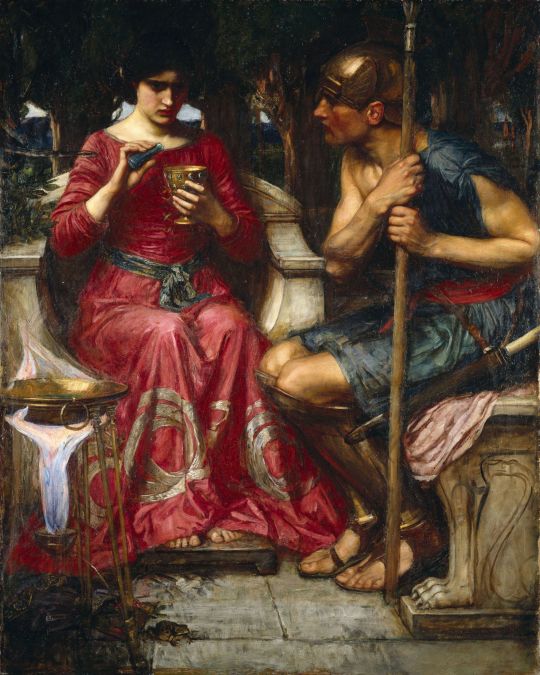
(Art: Jason and Medea by John William Waterhouse)
A similar harvesting of herbs and roots is seen in fragments of Sophocles’ play The Root-Cutters. What we have of the play states that “She [Medea] covers her eyes with her hand and collects up the white-clouded juice that drips from the cut in bronze jars...the covered chests conceal the roots, which this woman reaped, naked, with bronze sickles, while crying out and howling” (qtd. in Ogden 83). Hekate is then said to be “crowned with oak branches and snakes” (qtd. in Ogden 83). Then the women chant “Lord of the sun and holy fire [Helios], sword of Hecate of the roads, which she carries over Olympus as she attends and as she traverses the sacred crossroads of the land, crowned with oak and the woven coils of snakes, falling on her shoulders” (qtd. in Ogden 83). In this short but incredible fragment we see that Medeia calls on both Hekate and Helios, her grandfather, to bless their ritual. We also see a repeat of incantations to harvest magical herbs, and an introduction of her association with bronze.
Another one of Medea’s feats was charming the snake that guarded the Golden Fleece into a slumber. In the Argonautica, Apollonius of Rhodes writes:
“The monster in his sheath of horny scares rolled forward his interminable coils, like the eddies of black smoke that spring from smoldering logs...But as he writhed he saw the maiden take her stand, and heard her in sweet voices invoking Sleep [Hypnos], the conqueror of the gods, to charm him. She also called on the night-wandering queen of the world below [Hekate] to countenance her efforts...the giant snake, enchanted by her song, was soon relaxing the whole length of his serrated spine and smoothing out his multitudinous undulations...Yet his grim head still hovered over them and the cruel jaws threatened to snap them up. But Medea, chanting a spell, dipped a fresh sprig of juniper in her brew and sprinkled his eyes with her most potent drugs and as the all-pervading magic scent spread around his head, sleep fell on him.” (150-1).
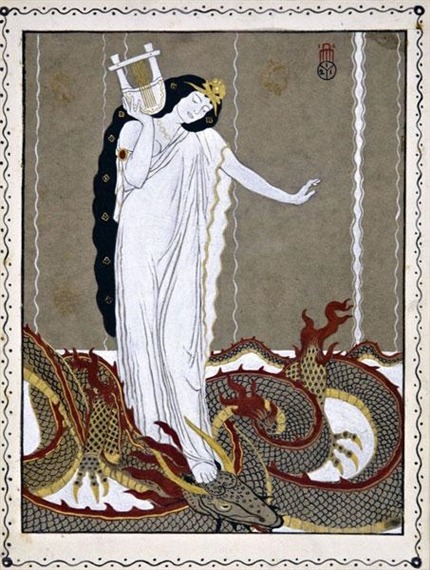
(Medea and the Dragon by Maxwell Ashby Armfield)
She was also said to have killed the giant Talos, a gift given to Zeus from Hephaistos, with her witchcraft, specifically the Evil Eye. In this more horrifying passage, it is said that:
“[W]ith incantations, she invoked the Sprits of Death [Keres], the swift hounds of Hades who feed on souls and haunt the lower air to pounce on living men. She sank to her knees and called upon them three times in song, three times with spoken prayers. She steeled herself with their malignity and bewitched the eyes of Talos with the evil in her own. She flung at him the full force of her malevolence, and in an ecstasy of rage she plied him with images of death” (Apollonius of Rhodes 192).
In this passage, she calls on the Keres, and with them is able to use the evil eye to bring immediate death to a direct creation of the gods. This is a horrifying feat, not only for the power it must require, but for her ability to kill in an instant.
Finally, she also is said to have rejuvenated Jason’s father Aeson. In Ovid’s Metamorphoses, Jason pleads with Medea to take years of his own life to give more to his father, but she rejects him saying that Hekate will not allow such a thing to take place. Instead, she offers that through her witchcraft, instead, if Hekate is willing to help her, she may rejuvenate him. Under the full moon, Medeia performs the ritual. She calls on Hekate, Night, the Moon, and Helios to aid her in her task (126-7). A chariot drawn by dragons appears to her and she takes it to gather herbs harvested with her bronze scythe. After nine days and nights, she returns to Jason to perform the ritual. The ritual is extensive and is essentially repeated in full. She builds two altars, one to Hecate and one to Hebe. She also digs two ditches on sacrifices a black sheep into the ditches, also pouring wine and milk into them. She also calls on the “deities of the earth” which may mean deities of the land or chthonic deities, and Hades. Once she appeases these gods and goddesses, she spells Aeson to sleep on a bed of herbs and tells Jason to leave her to perform her magic. She then dips sticks into pools of blood and lights them with the flames on the altars, then purifying the man once with fire, three times with water, and three times with sulfur.
She then adds many herbs, roots, and flowers to her bronze cauldron as well as “hoar frost gathered under the full moon, the wings of the uncanny screech owl with the flesh as well, and the entrails of a werewolf which has the power of changing its wild-beast features into a man’s. There also in the pot is the scaly skin of a slender Cinyphian water-snake, the liver of a long-lived stag, to which she also adds eggs and the head of a crow nine generations old” (Ovid 129). Then, she slits the throat of Aeson and replaced his blood with her potion, finally rejuvenating him.
There is more descriptions of Medeia’s magical feats throughout literature, but these are simply some of the most detailed and famous. She is clearly a very powerful witch and a significant figure within the history of Hekate worship. With her bronze cauldron and chariot of dragons, she is quite awe-inspiring.
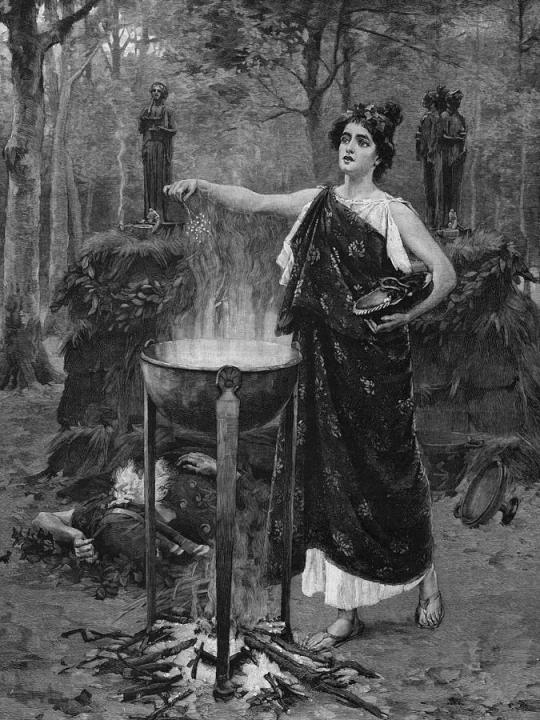
(Art: The Sorceress by R. Willis Maddox)
Medeia’s Character
One of the issues we run into with Medeia’s mythos is her defamation and portrayal as a child-murdering and vengeful woman. She is indeed vengeful against Jason, and rightfully so, for he bade her to leave her homeland, murder her brother, and constantly had her aid him with her witchcraft, only to abandon her for another. However, Euripides’ tale of her brutally murdering her children has some criticisms from scholars who note that there are other versions of the tale.
One such tale is that from Apollodorus who writes that “Another tradition is that on her flight she left behind her children, who were still infants, setting them as suppliants on the altar of Hera of the Height; but the Corinthians removed them and wounded them to death” (1.9.28). In the modern era, a scholar named Sarah Illes Johnston, author of Restless Dead and Hekate Soteira, also writes that Medea prays to Hera Akraia to make her children immortal, and Hera either declines or breaks her promise to fulfill this task, leaving the children to die (62-3). Johnston denies the implication of Medea in her children’s death, instead attributing it to circumstances outside her control or by the hand of another.
These different tellings of Medeia’s story fits with the Colchian princess who aids Jason in a much more believable way than the suddenly spiteful women who murders her children. This variation is less popular, the other being popularized perhaps to demonize magic and women of power.
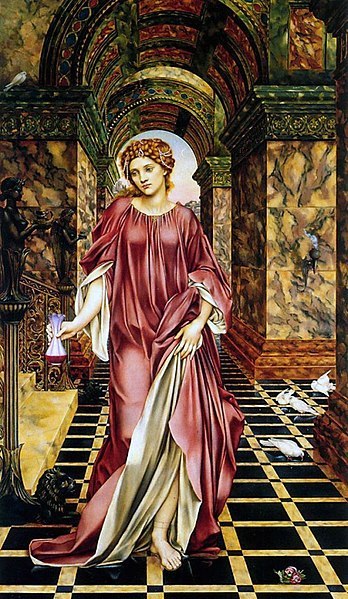
(Art: Medea by Eve De Morgan)
Worshipping Medeia
Now that Medeia’s character and mythological status has been discussed, I think it’s important to talk about how I actually go about worshipping Medeia. I worship Medeia in both divine and ancestral ways, which I suppose could be attributed to methods of hero worship in Ancient Greece. Worshipping Medeia can be done alongside Hekate and/or Helios, as well as alongside Kirke. If you observe the Mighty Dead or Witch Ancestors, she could also be worshipped alongside them.
Offerings
Offerings for Medeia can include wine, frankincense, milk, honey, food, poisons, sacred plants, bronze artifacts, candles, snake parts or figurines and dragon figurines, artifacts of witchcraft, and even Hekate iconography. One could also offer her blood, but that is up to your personal discretion.
Names and Epithets
Names/epithets I call Medeia include ‘Of the Many Spells,’ ‘Vengeful Maiden,’ ‘Witch Priestess of Hekate,’ ‘Medea of Poisons,’ ’She Who Knows All Herbs,’ ‘Giant-Slayer,’ one that could also be said of Hekate, ‘Princess of Colchis,’ ‘Granddaughter of Helios,’ ’Daughter of Sun and Moon,’ one I use to indicate her relationship to Helios and her devotion to Hekate, and Medea Pharmakeia, or Medeia of Witchcraft/Magic.
Sacred Objects
Sacred plants of Medeia could include any poisons, juniper, olive, and aconite specifically. Sacred animals include dragons and snakes. Bronze is also sacred to Medea, as are cauldrons of any kind.
Specializations
Medeia can be called upon for justice and vengeance, especially for spells of justice and vengeance, witchcraft of any kind, to bless herbs, for gardening, for aid in Hekate worship, for the downfall of your enemies, for protection from harm, for protection from snakes, and for guidance in magic.
Prayers to Medeia
Prayer for Medea’s Aid in Witchcraft
Prayer to Medea for Vengeance
Conclusion
In conclusion, while Medeia may not be a part of the usual canon of hero worship, or worship in general, if you are a devotee of Hekate or Helios, worshipping Medeia might be right for you. Likewise, any witch who observes the Hellenic pantheon should give serious thought to venerating Medeia in their practice.
Works Cited:
Medea by Euripides
Magic, Witchcraft, and Ghosts in the Ancient Greek and Roman Worlds by Daniel Ogden
The Voyage of Argo by Apollonius of Rhodes
Theogony by Hesiod
The Library by Apollodorus
The Metamorphoses by Ovid
“Corinthian Medea and the Cult of Hera Akraia” by Sarah Illes Johnston

(Art: Medea Casting Spells by Henry Ferguson)
#Medea#Medea worship#hellenic polytheism#hero worship#witchcraft#witch#paganism#Hekate#hecate#hellenic witchcraft#hellenic heroes
2K notes
·
View notes
Text
Well, that was cold

I have mod that makes diseases actually dangerous. (actually several of them and they’re all listed here on Pleasant Sims’ modlist)
The first rotation? Everything’s fine. The only one who fell ill was John Burb and he, as a family Sim, was able to soup himself to health in no time.
The second rotation... Ajaj Loner got sick.
With cold.
I was like, “I know flu is pretty dangerous with this mod but cold should be fine, right? I mean, I used to have it four times a year. So glad it’s not flu!”
I thought I was lucky.
I wasn’t.
After Ajaj’s turn ended, he was free to wander around and spread the cold everywhere.
Because they have chemistry and she was on a prowl, I even had Nina Caliente seduce Ajaj. She got the cold but I was like whatever, she’s a strong quasi-alien, running nose for a few days won’t kill her!
How fatally wrong I was I realized during a vacation that Nina went on with her sister and Ajaj. She was just chilling, sleeping in her hotel room, when all of the sudden, Grim Reaper!

You sure, Dina?
Nina was dead. Dead from the cold. And she was pregnant, no less!
I reloaded because it was on a vacation and Nina was the only playable Sim, so I was quite worried what would become of the grave. I managed to get her home and moved Chloe Curious in, so that someone can eventually plead for her. She was lucky the second time around and survived. Chloe got infected but survived as well.
But we had an epidemic on our hands now. Ajaj and Nina have been quite successful generously sharing their cold all across the hood and I failed to keep track of who has it.
Still, I thought it wasn’t so bad. I didn’t understand the scale, I was still thinking that it was just Ajaj, Consort Capp and the Pleasants.
Again, I was wrong.
When I got in the rotation to the Capps (the Capps 1), everyone was infected. I was still optimistic, though, because we were talking about a household where 2/4 Sims are Family and one is a Family Secondary, they can bathe in the soup!
The teens ate their soup and survived.
Consort died that night. He was due to die at the end of their round anyway but because he didn’t do so of old age, his grandchildren received no bonus inheritance.
The only one who gained something from that was Olive Specter who was delighted to see Consort, her crush, perish, so she could finally raise him as a zombie.

Unfortunately I couldn’t find a screenshot of her actually raising him, so here’s at the very least Olive walking menacingly to work.
Anyway, moving onto the Capps again (the Capps 2, Goneril edition), things looked bleak. Goneril was pregnant and she and all the kids were infected. Albany was immediately called to action to generate enough soup but the house devolved into utter chaos. Everybody had their soup but just as they recovered, they got infected again!
Ok, I was thinking, Consort was quite old and fragile. Nina must’ve had the cold for a long time, given she was on a vacation. There’s no way the kids are gonna die on the first day they got infected. They had the soup, so I’ll send them to beds, so they can get a good-night sleep and enough rest.
Nope.
Ariel, a child, died in her sleep.
Nobody was able to get to her in time to plead for her.
While I was contemplating an in-character way of resurrection, Desdemona, a young teen, died in her sleep just about two hours after her sister.
Again, nobody was fast enough.

Luckily, Miranda was already in college and she was roommates with Ophelia Nigmos, who was in possession of a genie lamp she was safeguarding from Olive. Hearing about the tragedy that befell her friend’s family, moved by the death of a little girl and her not much older sister, Ophelia the Family Sim offered Miranda the lamp on the spot.
Miranda rushed home to drop off the lamp and then ran off so she doesn’t get infected. Well, she did anyway but since I haven’t played the college Sims yet, I don’t know of her fate.
Hal made a good use of the lamp. He rolled the wants to resurrect both his sisters and that’s exactly what he did.
He triumphantly finished making the wishes...
And dropped dead.
Another young soul succumbed to cold.
But! Since there was still a wish left and his sisters were back alive, Desdemona swiftly brought him back.
Ariel’s and Hal’s resurrections were perfect.
Desdemona’s was faulty, so her personality got reversed.
But as long as they’re alive and preferably not zombies, everything will do.
The Capps were all cured! Hooray!
Wait. Not all Capps. There was still Regan’s branch and, predictably, they were all infected. And this time, there was no Family Sim in sight.
The only non-infected Sim in the family was a little toddler. The poor, poor child was in for a life-long trauma.
Kent went quick and quiet the first night of their round. Regan fortunately recovered. Cornwall did too. They had a very lucky start of the round all together, I may add. Kent’s tragic death was followed by Regan’s demotion that lead to her subsequent want to quit her job (...and she was the only one who was making any significant money), then Cornwall set the house on fire while cooking breakfast, then he got fired.

Poor thing. First got house-fired, then job-fired.
Regan’s LTW was to reach the top of the Law career, so she got herself a new job there. On her first day, she got promoted!
And she brought home a friend! Sweet!
No... nooooo...
It was Ajaj F*ckin’ Loner.
Both Regan and Cornwall got infected before you could say “act your surname and social-distance, you jerk!”
Cornwall died almost immediately. Unfortunately, Regan was asleep and failed to get up and ambush the Grim Reaper in time.
On the bright side, she recovered!
So I watch her go to work, the nanny arrives to baby-sit the toddler, everything seems to finally have settled down.
But then I spot an unexpected movement in the house.
It’s Titania Summerdream. Who let her in? I have no idea.
It would be quite sweet of her to check on her friend Regan after she lost two family members and to help with her young daughter.
If... if she didn’t have the fricking cold!
Regan returned from work and I rushed to have her send Titania away.
Of damn course she didn’t go before giving the cold to Regan.
Now it was the third time Regan got infected and there were no other family members to take care of the toddler if she dies. It was very suspenseful. I decided to use extreme measures and I teleported Albany in, made him selectable and had him cook the soup.
Instead of that, he proceeded to bicker with Regan.
If he got re-infected, I swear...
Anyway, after a three tries or so, Regan got her soup and Albany was on his merry way away.
What a relief! I sent Regan to sleep, trusting the soup to do its magic. The next morning her needs all looked great! No notification yet but I was sure it’s gonna arrive any second. When suddenly...
Yeap, she died.

Regan Capp died the way she lived. Paying her family’s bills.
I used Simblender again to quickly move in Hal. He was there in time to plead for Regan!
And for the first time in the Capp household, he actually made it! He pleaded!
And... and... lost.
So I had him stay to take care of the toddler until their round was over. Then I moved them both back with Goneril’s branch.

At the very least young Ione, the genius toddler with maxed Logic skill, got something resembling a birthday party with her cousin and his boyfriend Alexander Goth.
Given that Montys had their losses as well, the cold has already taken out much of the adult population of Veronaville.
The only two adults left (not counting fresh elders Albany and Goneril) in Veronaville were in fact the Summerdreams who were extremely lucky and with an abundance of soup, they survived.
To be completely honest, I’m very happy with the mod. I tend to play large hoods and although it tends to be rather tragic, the occasional epidemic of cold trims the population down a bit without me killing anybody off and it gives the game an additional bit of challenge and randomness.
...or maybe I’m just a sh*tty person to my Sims.
Bonus screenshots of the Strangetown cold outbreak:

Vidcund Curious spent two nights sleeping in a chair in his children’s bedroom because he was afraid they’re going to die from the cold in their sleep and wanted to be there to plead for them. In the end it actually happened, he pleaded and managed to save his daughter.

The Smiths had to be unfortunately visited by the Therapist. PT9 died on the day he was supposed to die of old age but hours prior, he became yet another victim of the cold. And it was very unlucky, since it meant no inheritance and by the Watcher, Jenny and their 5 kids could definitely use it. They were completely broke.
But not everything was morbid and tragic!

Lazlo rolled quite the unexpected want to get married to his girlfriend, Cassandra Goth. They weren’t engaged, she wasn’t pregnant, he’s not a Family secondary, and the date they were on wasn’t even in the stage Sims usually roll engagement wants, he simply rolled it out of the blue. And of course I went with it!
(Cassandra had recently divorced Don, rolling the wish to remarry almost immediately.)

The only family in the hood that could technically mass-produce medicine so that not everyone is dependent on the soup, the Beakers, of course didn’t. Why would they risk their hides, toying with the Mysterious Disease, when they didn’t have to? Instead, they social-distanced and spent the rotation raking in promotions and taking care of their army of children. (Loki kept rolling wants to get abducted and ARC wasn’t kind to them either. But with Loki being Family secondary and Circe leaving most of the parenting on him anyway, I don’t think they mind.)
Note the alien toddler, the second youngest child. He has 10 Nice points. That’s 4 points more than all 5 of his siblings and his parents combined. He’s gonna have a rough childhood, the poor thing.

Jill Smith managed to get nibbled on by the pack leader just in time, a few days before going to college. She’s thrilled by her new wolf-y powers! And regardless of what her mother says, she knows the fur goes with her school uniform just perfectly!

Rachel Pleasant, the youngest offspring of Daniel that he knows about (the second youngest overall), aged up into a child! And judging by the look on her face, she already knows how much of a mess her family is.

Not even being brought back from the dead made Desdemona Capp immune to the Summerdream charm. Bottom, the young Romance Sim, invited her girlfriend to hang out in their hot tub. It was an afternoon to remember for both of them.

Local ageing general married a successful young athlete, Kristen Loste. Unfortunately for everyone attending the wedding, the bride’s former roommate Chloe Curious decided that flirting with her literally the next interaction after Kristen said, “I do.” was a smart idea. No need to add that the wedding cake was left to rot forgotten, never cut. It was a sad wedding cake but even though it started to stink around two hours after the wedding, it still lasted longer than the marriage.

And far away in La Fiesta Tech, two estranged siblings were talking things out and healing their relationship.
Now I lost this hood (again) and started a new one, so the next gameplay post will probably feature the same characters in completely different circumstances and nothing is going to make sense but... what does anyway?
18 notes
·
View notes
Text
Nyx’s Complete List of Goth Names
Abaddon: From Greek, means "destruction" or "demon of the pit."
Acheron: The River of Woe in the Greek underworld.
Achlys: Greek primordial goddess of poison, misery, and sadness, personification of the death-mist.
Adonis: Means "lord" (as in Adonai). In Greek mythology, the most beautiful youth in the world, loved by both Persephone and Aphrodite. Died tragically.
Adrian/Adrienne: English, from Latin; means "from Hadria" (the Adriatic Sea). I've heard sources saying it means "dark one," but I haven't been able to confirm this. It's still a really cool, kind of gothy name. (Also the real name of Alucard from Castlevania.)
Ahriman: The Zoroastrian devil/evil god.
Akeldama: Means "field of blood," a place in Jerusalem associated with Judas.
Alastor: Greek, means "avenging spirit."
Alcmene: (Female) Means "might of the moon," Heracles' mother in mythology.
Alecto: One of the Erinyes (Furies), the goddesses of vengeance. Means "unceasing."
Altair: The brightest star in the constellation Aquila (the Eagle), from Arabic, meaning "the bird."
Amaranth: (Female) Greek; a mythical purple flower that never fades, a symbol of immortality.
Amethyst: A dark purple crystal, associated with wine and preventing drunkenness.
Andromeda: Greek, means "thinks like a man," the name of a princess in mythology, a constellation, and a galaxy.
Anubis: Jackal-headed Egyptian god of death and embalming.
Arcana: From Latin "hidden, secret" (literally "to shut in a chest"), refers to secrets or mysteries. Also refers to the groups of cards in a tarot deck (the major and minor arcana).
Arianrhod: Means "silver wheel," Welsh goddess of the moon, stars, and the flow of time.
Artemis/Diana: Greco-Roman goddess of the hunt, the moon, and virginity
Asmodeus: Means "wrath-demon," a Goetic demon appearing in a number of texts, representing luxury, sensuality, and lust. (Also Asmodai)
Asphodel: A white flower planted on graves, said to grow in the Greek underworld, and therefore heavily connected with death.
Astaroth: (Unisex) A demon in the Ars Goetia (from the Lesser Key of Solomon), described as a male demon and a Duke of Hell, but the name likely comes from the Phoenician goddess Astarte (or Ashtoreth), who is a version of Ishtar (Babylonian) and Inanna (Sumerian).
Astor: A French and German name from Occitan, meaning "goshawk." A goshawk is a bird of prey. I've read on naming sites that this name was originally a derogatory term for young men with hawk-like, predatory characteristics, but I haven't found anything to confirm this. This is the name of my alter-ego and one of the main protagonists of Shadowbook.
Astra/Astrid/Asteria: From Greek, "star." In Greek mythology, Asteria was a Titaness of astrology and prophecy, the mother of Hecate. An aster is also a star-shaped flower.
Atropos: The last of the Moirai (Fates), who cuts the thread at the end of life.
Autumn: The darkening part of the year, when everything is dying, and Halloween happens.
Azrael: The name of the Angel of Death, means "whom god helps." (Also Asriel)
Azazel: A Watcher's name, means "scapegoat." Taught humanity the arts of weaponry and cosmetics. Commonly associated with demons and evil.
Baphomet: A goat-headed, winged deity associated with Satanism; obscure etymology.
Bastet: Egyptian goddess of cats.
Belial: A Hebrew name meaning "worthless," a name of the devil or a demon.
Belladonna: Also called "deadly nightshade," an extremely poisonous plant that causes hallucinations and death.
Bellona: Roman goddess of war
Bezaliel: Means "shadow of God" or "damaged," a Watcher's name.
Blodeuwedd: Pronounced "bluh-DIE-weth," means "flower-face." A Welsh goddess who was turned into an owl.
Bram/Brom: Technically short for Abraham ("father of a multitude"), the author of Dracula, Abraham "Bram" Stoker.
Bran: Welsh, "raven." The name of Bran the Blessed, a giant and king of Britain in Welsh mythology.
Branwen: (Female) Welsh, means "white raven" or "fair raven."
Breksta: Lithuanian goddess of night, dreams, and twilight.
Caligo: Latin word for “mist,” “gloom,” and “darkness.” (Calignes is the plural, which could also work) (feminine)
Calypso: Greek, "she who conceals." The nymph who kept Odysseus imprisoned on her island.
Carmilla: A lesbian vampire from the gothic novel of the same name, predating Dracula. The name seems to have been invented by the author.
Cassius: Roman, "empty, hollow."
Ceridwen: Welsh enchantress or goddess who stirs the cauldron of poetic inspiration.
Cernunnos: Celtic forest god depicted as having a stag's antlers.
Chiroptera: Literally means "hand wing," the order of bats in taxonomy.
Circe: Means "circle." In Greek mythology, a sorceress who turned Odysseus' men into pigs (and later helped them).
Cora: From the Greek name Kore, meaning "maiden." A name for Persephone. (Also, Coraline.)
Cornix: A princess transformed into a crow by Athena in Ovid's Metamorphosis.
Corvus/Corax: Corvus corax is the scientific name of the common raven.
Crimson: Dark, rich red, the color of wine or blood. One of the Gothiest colors that isn't black. It's very easy for this to sound banal or cringey, especially if it's a character's given name, so use with caution. Scarlet works, too, if you want something easier to use as a given name.
Damian: From Greek, means "to tame," tends to be associated with demons or vampires, a bit cliche at this point.
Dantalion: A Goetic demon, the name is particularly cool.
Desdemona: A tragic character in Othello, comes from Greek and means "ill-fated." Can be shortened to "Mona."
Desmodus: The genus of common vampire bats. (D. rotundus)
Devana: Slavic version of Artemis/Diana, goddess of the hunt.
Dorian: The corrupt, depraved, nearly immortal and astonishingly beautiful protagonist from The Picture of Dorian Gray. (Turns out Oscar Wilde invented the name; it did not exist before the book was written.)
Dracul: Romanian, "devil" or "dragon." What really needs to be said?
Ebony: A very dark wood.
Echo: In Greek mythology, a nymph who was cursed so she would only repeat the names of others; died while pining after Narcissus.
Edgar: Anglo-Saxon, "rich spear." The name of the one and only Edgar Allen Poe (also, my cat).
Eidolon: A type of spirit or ghost in Greek liteature. Also a genus of bats.
Eirlys: Welsh, "snowflake."
Elatha: An Irish god, described as the "beautiful Miltonic prince of darkness with golden hair." Not sure what the source for that is, but cool!
Elvira: Spanish, means "foreign true," a stereotypical Goth name (and the name of the Mistress of the Dark!). Actually, I first ran across the name in reference to a vengeful ghost called Elvira Blood in New England folk legend. Spooky!
Empusa: A kind of Greek female demon (similar to Lamia) that served Hecate.
Endora: Comes from the Witch of Endor, a Biblical sorceress.
Endymion: In Greek mythology, a handsome shepherd whom Selene fell in love with. Zeus granted him eternal sleep so he would never age. Means "to dive, to enter."
Erebus: Greek primordial god and personification of darkness.
Esmeralda: Spanish name meaning "emerald." (Also, the heroine in The Hunchback of Notre Dame.)
Ethelinda: Anglo-Saxon, means "little serpent."
Euryale: Greek, means "far-roming," the middle Gorgon sister.
Eurynomos: Greek chthonic spirit of corpses.
Eventide: It could work as a name.
Fenrir: A wolf demon in Norse mythology, the son of Loki.
Finvarra: Irish, King of the Fairies (and sometimes King of the Dead), a benevolent entity that ensures a good harvest and abundance.
Gabriel: The angel. Means "warrior of god." Gabrielle also works (and is the name of Lestat's mother).
Gehenna: A Hebrew name for Tartarus or Hell.
Golgotha: From Hebrew, "skull," the place where Jesus was crucified.
Grimm: The surname of two German brothers who recorded a classic collection of oral folklore and fairy tales, many of which are very... well, grim.
Habundia: A Celtic name for the queen of witches and night creatures, possibly another name for Nicnevan. Etymology uncertain.
Hades: The Lord of the Underworld in Greek mythology (also the name of the Underworld itself).
Hawthorn: A type of shrub steeped in folklore, associated with fairies and with Beltane (1st May).
Hecate: Greek goddess of witchcraft, magic, the occult, the moon, necromancy, the Underworld, and the crossroads. Means "worker from far off."
Hellebore: A type of evergreen flower, some species of which are poisonous. Believed to summon demons, also believed to cure madness.
Hemlock: A plant used to poison people.
Herne: "the Hunter," a ghost that haunts Windsor Forest (sometimes identified with The Horned God).
Hesperos/ia: The evening star.
Hypnos: The Greek god of sleep.
Iblis: Satan in Islamic lore.
Idris: Welsh, "ardent (passionate, fiery) lord."
Igor: Russian, "bow-warrior." Became famous as the name of Frankenstein's hunchbacked assistant, even though he doesn't exist in the book and his name in the original Universal film was Fritz.
Ingram: Swedish name meaning "Ing's raven."
Iolanthe: Greek, means "violet flower." (eye-oh-LAHN-thay)
Iseult/Isolde/Isolt: A tragic lover in Arthurian legend.
Jasmine: A type of flower, in this case referring to Cestrum nocturnum, or night-blooming jasmine.
Kali: Hindu goddess of destruction, name means "the black one."
Kasdaye: Means "hidden power," the name of a Watcher (another name for Tamiel). (Unisex)
Kiara/n: Gaelic, means "little black one."
Kimaris: A Goetic demon. (Male)
Kokabiel: Means "angel of the stars," a Watcher.
Lacrimae: Latin word for tears.
Lamia: A female demon in Greek folklore who devours children. The name of the witch in the film version of Stardust.
Lenore: A variant of Eleanor (also a good name), means "foreign," the lost love of the protagonist of "The Raven," also has her own poem.
Leshii: A Russian god of hunting, similar to Veles
Lethe: River of Forgetfulness in the Greek Underworld.
Leviathan: From Hebrew, "twisted in folds," a Biblical sea monster. Sometimes associated with Midgard's Serpent.
Libitina: A Roman goddess of corpses, funerals, and the dead.
Ligeia: Greek, the name of a Siren, also the subject of a Poe story of the same name.
Lilah: Comes from the Arabic Leila, meaning "night."
Lilith: Means "of the night" or "screech owl." In Hebrew mythology, Adam's first wife and the Queen of Demons. She refused to submit to Adam, so she left Eden and began screwing around with demons. Often considered a succubus or vampire, or a champion of feminism. A lilim is also a succubus or incubus.
Loki: Trickster god in Norse mythology with ambiguous morals.
Lorelei: German, means "murmuring rock," the name of a German Siren.
Lucius/Lucifer/Lucien: All mean "light" or "light-bringer," a name associated with Satan.
Lucy: From Dracula, also could be a shortening/feminization of Lucifer. (Still means "light.")
Luna: The Roman personification of the moon.
Lycoris: A Greek word that means "twilight," the name of an Asian red flower, associated with death and the underworld (much like Asphodel).
Maeve: Comes from Gaelic, means "the intoxicating one." Associated with the Fairy Queen Mab.
Makaria: Greek goddess of blessed death, a daughter of Hades and Persephone.
Mania: Etruscan/Roman goddess of the undead, ghosts, and underworld spirits, goddess of madness. Also a modern medical term referring to a specific mental illness.
Mara: A name steeped in darkness, referring to a nightmare spirit (nightmare), a (benevolent) goddess of death in Latvian mythology, a (male) demon in Buddhist mythology, and a Sanskrit word meaning "death."
Medea: In Greek mythology, the sorceress who helped Jason, but then went on a murderous rampage when he left her. Considered to be a priestess (or, rarely, daughter) of Hecate.
Megaera: One of the Erinyes (Furies), the goddesses of vengeance. Means "grudge."
Melanie: Greek, "black" or "dark."
Melantha: Greek, "dark flower."
Melinda/Mindy: English, "black serpent."
Melinoe: Greek goddess of ghosts, nightmares, and madness, a daughter of Hades and Persephone.
Mephistopheles: The name of the devil in the Faust legend, could be from Hebrew and mean "disperser of lies," or from Greek and mean "does not love the light."
Merle: (Unisex) from French, "blackbird."
Mina: From Dracula. Short for Wilhelmina, a German name meaning "will-helmet."
Morana/Marzanna: Slavic goddess of winter and death.
Morgan/Morgana: From Welsh, means "sea-circle," the name of Morgan le Fay, a sorceress in Arthurian Legend (who may be good or evil, depending on your interpretation).
Morpheus: The Greek god of dreams, the main protagonist of Neil Gaiman's Sandman comics. (Also, The Matrix.)
Morrigan: An Irish goddess of death, battle, and ravens, name means "great queen."
Morwenna: A Welsh name meaning "maiden." ("Morwanneg" is the name of the witch in Stardust.)
Nepenthe: A magical drug from the Odyssey that cures sorrow and causes forgetfulness.
Nephthys: Means "lady of the temple," the Egyptian goddess of the dead, mate of Seth and mother of Anubis.
Nergal: Mesopotamian god of death, war, and destruction.
Nicnevan: Queen of the Fairies in Scottish folklore. She is the Scottish version of Hecate.
Nightshade: A family of plants including tomatoes, potatoes, and eggplants, but also the notorious deadly nightshade.
Nisha/nt: A Hindi name meaning "night."
Nocturne: Self-explanatory. Refers to a night prayer, a musical composition evoking night, or a night scene in art.
Nyctala/Nyctea: Two obsolete genera of owls. Nyctala is the genus of Boreal owls before it was changed to Aegolius, and Nyctea was the genus of Snowy owls before it was changed to Bubo. Both probably mean or are related to "night."
Nyctalus: A genus of bats.
Nyctimene: A princess from Ovid's Metamorphoses who was so ashamed at having been molested by her father, she refused to show her face in daylight. Out of pity, Minerva (Athena) turned her into an owl. Also a genus of bats.
Nyx: A Greek primordial goddess and personification of the Night. (also Nox)
Oberon: From French, means "elf-ruler," the name of the Fairy King in A Midsummer Night's Dream (Referred to in one scene as the "king of shadows").
Obsidian: A shiny black volcanic stone.
Onyx: A type of banded stone, most famously black. (The word comes from the Greek for "fingernail.")
Ophelia: A tragic character in Hamlet, which probably comes from Greek and means "help."
Orcus: A Latin word for Hell, and a Roman god who punished the dead (possibly an epithet of Hades/Pluto).
Orion: A hunter in Greek mythology, and the famous constellation.
Orlok: The name of the ugly-looking vampire from Nosferatu.
Orpheus: Greek name, possibly comes from the word orphe, "darkness." The name of a demigod with an impossibly beautiful singing voice who attempted to rescue his love from the underworld, failed, and then died tragically.
Pan: Greek goat-horned god of nature, herds, and lust, induces "panic."
Pandora: Name means "all-gifted." In Greek mythology, the name of the first woman, who opened a box that unleashed evil upon the world.
Pandemonium: The capital city of Hell in Paradise Lost, name literally means "all demons."
Persephone: Greek Queen of the Underworld, wife of Hades, and goddess of springtime. You probably know her story. Her name might mean "thrasher of grain" (which would make sense for an agricultural goddess), but could also mean "slayer."
Phaenon: Means "shining" in Greek, refers to the planet Saturn (which has long been associated with darkness in mythology, being the furthest planet from the sun that is observable with the naked eye).
Pluto: Hades' Roman name, also the ninth planet, or what was the ninth planet.
Ransley: An English name meaning "raven's meadow."
Raven: This is by far the most cliche Goth name there is (I originally created this list to provide alternatives to the name “Raven”), but it’s classic, it’s simple, it’s unisex, and it’s undeniably Goth.
Ravenna: Self-explanatory, also an Italian city.
Renwick: Scottish surname meaning "raven settlement."
Sable: A word referring to the color black.
Salome: From Hebrew shalom, "peace." The daughter of Herod and Herodias, unnamed in the Bible, who requested the head of John the Baptist and danced the Dance of the Seven Veils.
Samael: Means "venom of God," a vicious angel of death, the mate of Lilith. He is not technically a fallen angel, but a servant of God who does the dirty work.
Sekhmet: Egyptian goddess of war and destruction, with the head of a lioness. Her name means "power" or "might." Her epithets included "Mistress of Dread," "Lady of Slaughter," and "She Who Mauls." Ra had to stop her from killing people by getting her drunk on beer that was dyed to look like blood.
Selene: Greek personification of the moon. (Includes "Selena" and variants.")
Senka: Basque name meaning "shadow."
Seren: (Unisex) Welsh name meaning "star."
Seth: A name of Set or Sutekh, the Egyptian god of evil, chaos, and storms. He killed his brother Osiris and cut his body into pieces, and then was defeated by Horus. His head is that of an animal that looks kind of like an aardvark but is not an actual existing creature (at least not anymore). He was associated with the color red and the desert. His name possibly means "one who dazzles."
Shadow: Self-explanatory.
Silas: From Greek, means "from the forest." In The Graveyard Book by Neil Gaiman, it's the name of a [spoiler]vampire.
Silver: The color of the moon, and it looks nice with black.
Sinistra: Technically, it's Latin for "left," but it obviously has "sinister" connotations.
Skiá: Greek word for "shadow" or "shade."
Skotos: Ancient Greek word for "darkness," especially the darkness of death or the netherworld, or obscurity.
Skuld: The last of the Norns (Fates), representing death. Means "debt."
Sombra: The Spanish word for "shadow."
Somnus: Roman name for Hypnos, sleep.
Spyridon: Greek name referring to wicker baskets, which implies wealth. Could also be connected to the Latin spiritus, which means breath or spirit. Usually shortened to Spyro.
Stella: The Latin word for "star."
Stheno: Greek, means "forceful." The eldest of the Gorgon sisters.
Styx: The River of Hate in the Greek Underworld, the most famous of its rivers. The souls of the dead are ferried across it by Charon, and the gods (foolishly, if you ask me, seeing as they always regret it) swear on the Styx to make unbreakable oaths. The word "Stygian" means "of the River Styx" and refers to something very dark or abyssal.
Summanus: Roman god of nocturnal thunder.
Sylvia/Sylvana: Latin, "from the forest."
Tanith: Phoenician, "serpent lady."
Tartarus: The deepest hell-pit of the Greek Underworld, where evildoers are punished.
Tempest: A wild storm, from the Latin for "time."
Thanatos: The Greek personification of Death.
Tiamat: Babylonian primordial dragon goddess.
Tisiphone: One of the Erinyes (Furies), the goddesses of vengeance. Means "murder-retribution."
Tristan: Welsh, "riot, tumult." (Although it sounds like the Latin tristis, which means "sad.") The name of Isolt's lover in Arthurian Legend, and the name of the protagonist in Stardust.
Valerian: Roman, means "strength" or "valiant," also the name of an herb.
Vega: (Unisex) Latin from Arabic, means "falling" or "swooping," a star in the constellation Lyra. It is one of the brightest stars in the entire sky.
Veles: Slavic horned god of cattle, forests, magic, and the underworld.
Veliona: Slavic goddess of death
Velvet: A fabric that most goths love to wear.
Vervain: An herb (verbena), meaning "sacred bough," considered a magical or holy herb in multiple cultures.
Vesperus: (or just Vesper), a Roman name meaning "evening." (Vespera for a girl)
Vespertilio: A genus of bats.
Victor: The first of the trio of gothy male "V" names, means "conqueror," as in "victory." Frankenstein's first name. (Victoria also works for a girl.)
Vincent: The second of the trio of gothy male "V" names, also meaning "conquering," from Latin.
Vivian: The Lady of the Lake in Arthurian legend. From French, means "lively." (Another name for the Lady is Nimue, which is Welsh and may be related to the Greek word for "memory." She sealed Merlin in a tree.)
Vlad: The third of the trio of gothy male "V" names, the name of Vlad Tepes or "Vlad the Impaler," the real-life Romanian prince who inspired Count Dracula. It's Slavic and means "ruler."
Willow: A beautiful and mournful-looking tree.
Winter: The dark, cold season. Unisex!
Yvaine: Scottish, means "evening star," the name of the star in Stardust.
Zagreus: The name of a chthonic Greek god who was potentially a son of Hades and Persephone or Zeus and Persephone, considered in Orphic lore to be Dionysus before he was dismembered and reincarnated.
Zillah: Hebrew name meaning "shadow."
#names#goth names#writing#gothic names#character names#mythology#gods and goddesses#literature#gothic lit#name list
83 notes
·
View notes
Text
Uberhood Story Episode 1 Summary
Figured it might be useful since it’s pretty long. Spoilers under the cut! Episode 2 summary coming soon, as will the Episode 3 summary when that is done of course.
Episode 1
On a normal Strangetown evening while it rains cats and dogs, Olive Specter calls General Buzz Grunt and asks him to come over. She shows him an ancient artifact, temporarily shaped into the form of a Freezer Bunny statue, and summons Lyla Grunt’s ghost.
Lyla explains that she was blackmailed by a group calling themselves the “World Organization Of Hostile Objectionable Obliterators”, led by Mystery Sim, that wanted her to take the artifact. As soon as she touched it, she was electrocuted and died. It is implied that only supernatural beings can touch the artifact without being harmed. As her ghost disappears, Buzz and Olive decide to move the artifact somewhere else where it can recieve military protection.
Back in Pleasantview, Woodland Park, Mortimer Goth and Dina Caliente are cuddling up on a bench. The former speaks vaguely about a change being on the way, then jumps into the pond to take a swim. Dina goes home and says they will see each other for dinner tonight.
Cassandra Goth recieves a phonecall from Officer Kauker that her father has been forcibly removed from Woodland Park by the police. She remarks that they should be more respectful since Mortimer saved SimNation many years ago, then hangs up. Concerned about her father’s recent impulsive behavior, she asks Don Lothario if he knows what’s happening, since he started acting odd after they got engaged. Don denies it, but flashbacks reveal that Don and Mortimer used to be romantically involved.
In Desiderata Valley, John Mole wakes up next to Sharon Wirth, and shows interest in committing more to their relationship, but she declines. The Grim Reaper, looking like his The Sims 4 self, looks at them through the window, then goes for a swim in John’s swimming pool. Natasha Una watches them through a telescope while wearing a suit of armor. John talks to his parrot, Peggy, and thinks about his time in Strangetown when he tried to solve Bella Goth’s disappearance.
In Strangetown, Erin Beaker finds her roommates Kristen Loste, Lola Curious and Chloe Curious passed out in her room, implied to have been drinking and watching sports games all night while Erin worked extra shifts at the pet shelter due to the cat and dog rain crisis. It is revealed that Erin has a pet wolf named Sansa. The wolf bites her.
In Pleasantview, Dina worries about her relationship with Mortimer, while her twin sister Nina Caliente suffers from flashbacks from when Gordon King broke into their house and got into a fight with her.
Olive magivestigiums into Mortimer’s home. It is said that she tried to kill him over a misunderstanding at some point. Olive tells him that they have to forget about the past and focus on gathering their own army to fight the one Mystery Sim has built, as rumours say that they have found their own artifact and is using it to power up their forces. Mortimer says that “she” (hinted to be Cassandra) said that a storm was coming which shows that her powers are getting stronger, but he doesn’t think they should involve her since she deserves to live a normal life. It is also revealed that Mortimer thinks Bella is dead, but Olive disagrees as she is unable to reach Bella through her artifact. Olive asks Mortimer to gather the people he chose before tonight. Alexander Goth eavesdrops on the conversation.
Alexander wonders what’s going on, and Mortimer declares that they are leaving Pleasantview immediately. Cassandra, home from a date with Don, disapproves and demands answers about Mortimer’s behavior. Mortimer pulls out a remote control-looking item and presses a button.
In Strangetown, Buzz Grunt recieves a call that soldiers assigned to protect the artifact were attacked this morning. One of them says that they saw a woman in a red dress. Buzz yells at them to call John Mole and offers to pay him twice the amount, personally, to open up the case again.
In Desiderata Valley, John gets a phonecall about the case and accepts the job. He calls Natasha to ask her to watch Peggy for him while he is gone. Natasha accepts, but we see that she is standing in the backyard of the house when answering the call, staring down at Marcel Jocque, who has seemingly drowned in the pond. The Grim Reaper, now in his The Sims 2 form, remarks how awful it is (not the death, the rain).
In Strangetown, The Singles household worries about Erin, who is still not home. Chloe angrily remarks that they have nothing to worry about since The Night Beast has been gone for years.
In Pleasantview, Mortimer carries a sleeping Cassandra and Alexander out to his car then drives away.
Dina wonders why Mortimer cancelled dinner at the last minute, and expresses concern to her sister, questioning herself and whether she has done something to upset him. Before Nina can answer, Olive magivestigiums in, furious that Mortimer has ran away from the mission. She explains to them about the World Organization Of Hostile Objectionable Obliterators and says that she has to track him down, and wants to bring one of the people he chose for his army. Dina offers to go, thinking he chose her, but it turns out that Mortimer chose Nina, making Dina feel even more rejected. Nina promises that she will find Mortimer and make him explain himself to her.
In Strangetown, Cassandra is angry with her father for kidnapping her and Alexander. A werewolf approaches their car, as does a vampire. The vampire, revealed to be Virginya Feng, talks to Mortimer, saying that she admires him for saving SimNation with his invention many years ago. Virginya expresses sympathy and bites him in the neck, but is surprised when his blood tastes weird. Mortimer then reveals that he is immune to vampire bites, and also that he is immortal.
Olive and Nina appear, with the former screaming at Mortimer for running away from the mission. Mortimer says that he can’t lose someone close to him again, and says that Dina is better off without him anyway, but Olive protests. She pulls out another artifact, one she found in Mortimer’s home, and approaches Cassandra with it, telling her that it can be used to awaken her powers so she can defend SimNation. Cassandra accepts. Nina punches Mortimer in the face for leaving Dina. After Cassandra goes through some sort of transformation with the artifact, Nina is up next.
Buzz goes to check on how the defense of the artifact is going, and is angered when he sees that all the soldiers are gone. While he is yelling to himself about their incompetence, he is electrocuted by Sara Starr, who is revealed to have left the Kine Society to join the World Organization Of Hostile Objectionable Obliterators. She looks away while Buzz dies, unlike her three helpers Luisa Libros, Optimum Alfred, and Cassandra Goth from an alternate universe (spelt “Kassandra”).
Nina, Cassandra and Virginya hide behind the group’s car. Cassandra’s skin has started glittering after exposure to the artifact for unknown reasons. Suddenly, the werewolf they saw earlier appears, despite the fact that Olive said she was going to look out for it. The trio attacks so the other group won’t kill the werewolf, and a huge fight breaks out.
Cassandra however, is not fighting physically, and instead starts screaming while seeing visions of people leaving her (Mortimer being abducted by aliens, Don being electrocuted while attempting to repair his stereo, Mary-Sue Pleasant being hit by a satellite, and Goopy GilsCarbo taking Alexander with him with the support of a Social Worker, Alexander happily hugging Goopy). It turns out that Kassandra is producing these visions. She mocks Cassandra’s fears and taunts her, saying that no one actually cares about her.
Luisa, who has managed to win her fight over Nina, makes fun of her, saying that it was easy and that it was no wonder that even the burglar could beat her. Nina gets up and yells at her, causing lightning to hit Luisa and instantly kill her, turning Nina’s skin dark green in the process. The survivors of the group run away, and the trio picks up the artifact.
Emily Emory is surprised when someone knocks on the door of Espiritu Estate, but it turns out that it is the Strangetown police (consisting of Jason Cleveland, Jenna Cameron and Chandler Couderc) coming in for questioning. It is implied that it has happened several times. They ask if Bella Goth has returned to the mansion, to which Emily replies that she has not. The ghost of Isaac Rossum plays with the stereo.
Mortimer, Cassandra, Alexander and Nina are allowed to stay at Olive’s mansion over the night. Olive is worried about where they will keep the artifact, since she can’t keep it in her house much longer, which was why she called Buzz to begin with. The werewolf from before detransforms, and is revealed to be Erin Beaker.
John arrives in Paradise Place, one of Strangetown’s villages, and knocks on Circe Salamis’ door. He asks to see Loki Beaker, but Circe declares that Loki has changed drastically since last time John saw him, and that they have gotten divorced. John asks if he can stay at her place, and she accepts, but points out that he has to sleep in the couch since someone else lives in the guestroom. They talk about how Circe used to own a lot of animals, that she claims to have gotten from Felicity Island and Wanmami Island, and it is revealed that it was Circe who gave John his pet parrot.
Cassandra and Mortimer talk about her right to decide things for herself, even if they could be dangerous, and Cassandra asks him not to keep any more secrets from her. Mortimer thinks about his romance with Don, but still lies to Cassandra and says that he is not keeping anything from her.
Circe and John share a kiss and start making out, when John suddenly pulls away from her and says that he can’t continue since he has a girlfriend. However, Circe doesn’t believe him, and thinks that Loki has hired John to try to manipulate her into handing over Nervous Subject, so she uses a spell to transform John into a cat, and declares that he will be Nervous’ pet now.
#about uberhood story#ghosts tw#death tw#military talk tw#drowning tw#stalking tw#murder tw#violence tw#alcohol tw#police tw
2 notes
·
View notes